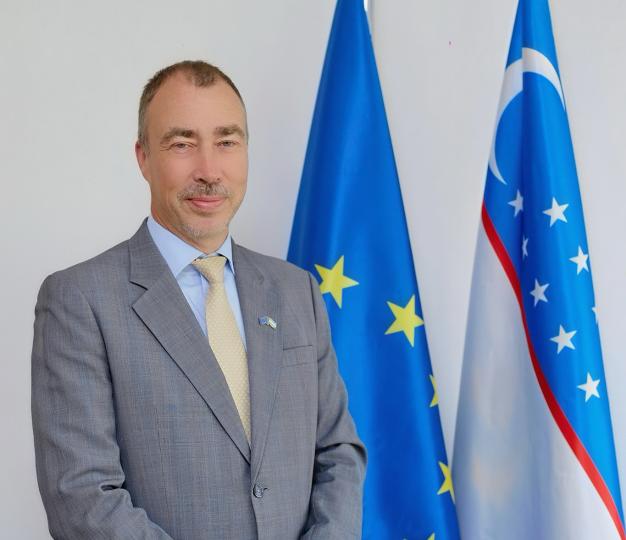BAKU, Azerbaijan, November 29. European Union’s strategic goal in the short-term perspective is the timely signature of the Enhanced Partnership and Cooperation Agreement (EPCA) with Uzbekistan, Ambassador of the European Union Delegation to Uzbekistan Toivo Klaar told Trend in an exclusive interview.
"The most important task for me is to ensure the continuity of the extensive collaboration we enjoy between the EU Delegation and the authorities of Uzbekistan in all areas. I have already established good working relations with representatives of the government and parliament of Uzbekistan, regional authorities, academia, and civil society. My top priorities include preparing for the key events that will take place next year, such as the first-ever EU-Central Asia summit and the EU-Central Asia economic forum, and continuing to work on all aspects of the Global Gateway, including digital connectivity and critical raw materials. This comes after the highly successful EU Economic Days in Uzbekistan at the beginning of November, and we are currently introducing the ninth EU Film Festival in Uzbekistan," he stated.
He asserts that the EU remains dedicated to bolstering Uzbekistan's reform process and democratic transition. The EU has opened up its markets to Uzbek goods through the GSP+ regime and engaged with the authorities to help create a business climate in Uzbekistan that will attract even more European investment.
He also mentioned the EU's Multi-Annual Indicative Programme (MIP) for 2021-2027, which aims to bolster the 2030-Uzbekistan Strategy by emphasizing three primary areas of focus: good governance, the green transition of the economy, and a sustainable agro-food sector. Cross-cutting themes of digitalization, gender equality, and human rights complement these areas.
"We have committed 76 million euros to projects that address corruption, improve public service delivery, strengthen environmental laws, clean up hazardous chemical waste, assist Uzbekistan in accessing the WTO, promote innovation in the agriculture sector, and many other areas. Following a recently conducted mid-term review, we will continue to support the mentioned priorities while also adding new ones. These priorities include spatial planning, transportation, and critical raw materials, all of which are integral to the European Union's Global Gateway initiative," highlighted Klaar.
He stated that the EU’s public service delivery initiative has achieved remarkable success in the digital transformation of over 40 services, including, for instance, the streamlined application process for obtaining a birth certificate. This has significantly streamlined access for Uzbek citizens to leverage these services, particularly in underserved rural regions.
“Moreover, digitalizing public services has significantly reduced the risk of corruption. In the agriculture sector, which is of particular importance to the regions, the EU has advised the government on the necessary reforms to make the sector more profitable, more resilient against climate change, better for the environment, and better at producing safer food for the consumer. Here we focus on the millions of smallholders who are the backbone of Uzbekistan’s food security. Successes include the first steps in land reform, providing stronger land tenure rights, and the adoption of the food safety law. We have also concretely supported horticulture and livestock businesses to improve their production with technical advice, preferential loans, and the rehabilitation of irrigation systems,” the ambassador noted.
He underscored that through the SECCA (Sustainable Energy Connectivity in Central Asia) project, the EU focuses on energy efficiency and green transition in Central Asia. The goal is to support the countries of Central Asia in their energy transition efforts by building on the region’s potential in renewable energy and capacity for higher energy efficiency, as well as by promoting sustainable energy connectivity in the region. Moreover, with the Regional Team Europe Initiative (TEI) on Energy, Water, and Climate Change, the union will continue supporting the green energy generation potential of Central Asian countries.
“Furthermore, as part of the Global Gateway Strategy in Central Asia and the Trans-Caspian International Transport Route (TITR), we will focus on increased connectivity between Europe and Central Asia, including energy connectivity, to attract investments, improve trade flows, and increase stability and growth in the region. Uzbekistan is a key player in Central Asia’s trade routes, and improved infrastructure along the Trans-Caspian International Transport Route will provide the country with more direct access to European markets via the Caspian Sea and Caucasus,” he said.
Toivo Klaar reminded that in January 2024, the EU held an Investors Conference in Brussels, which brought together governments, financing institutions, businesses, and civil society from Europe and Central Asia to discuss the required investments to transform the Trans-Caspian International Transport Route into a cutting-edge, multimodal, and efficient route, connecting Europe and Central Asia within 15 days. This will be necessary to boost trade and investments between the EU and Uzbekistan in the years to come. The estimated need for TITR-related investments amounts to 18 billion euros.
"Investments in Central Asia, along with Uzbekistan's regional connectivity and economic growth potential, exhibit a positive trend. The EU’s involvement introduces higher standards for sustainability, digitalization, and efficiency in infrastructure projects. Uzbekistan stands to benefit from adopting these practices, which will improve the overall quality of its transport and logistics sector. Moreover, infrastructure projects linked to the TITR can create jobs in construction, logistics, and supporting sectors within Uzbekistan. Therefore, this will not only increase trade but will stimulate local economies and foster skill development,” he added.
To note, in September 2024, Toivo Klaar was appointed to the position of EU Ambassador to Uzbekistan, following a career that spanned seven years as the Special Representative of the European Union for the South Caucasus and the Crisis in Georgia.







